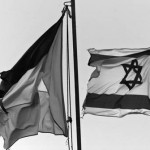Wednesday
Sep082010
Israel-Palestine: Israel's Security Summit, Abbas and Netanyahu Clash on Core Issues
 Wednesday, September 8, 2010 at 6:53
Wednesday, September 8, 2010 at 6:53  Israel's Security Summit: On Monday, Israel's Prime Minister Benjamin Netanyahu met with members of the Israel Security Council led by Maj.-Gen. (ret.) Uzi Dayan. In the meeting, four strategic measures were discussed in detail: "Maintaining a solid Jewish majority in the State of Israel, preventing the creation of a hostile Palestinian entity that could threaten Israel from Judea and Samaria as is the case today in Gaza, the Iranian threat, and the de-legitimization assault against Israel."
Israel's Security Summit: On Monday, Israel's Prime Minister Benjamin Netanyahu met with members of the Israel Security Council led by Maj.-Gen. (ret.) Uzi Dayan. In the meeting, four strategic measures were discussed in detail: "Maintaining a solid Jewish majority in the State of Israel, preventing the creation of a hostile Palestinian entity that could threaten Israel from Judea and Samaria as is the case today in Gaza, the Iranian threat, and the de-legitimization assault against Israel."The Israel Security Council also stated that there must be clear red lines during negotiations with Palestinians, especially in maintaining the Jordan Valley as Israel's eastern security border. The need to to strengthen Jewish-democratic identity in Israel and to prevent Iran from arming itself with nuclear weapons were also conveyed to PM Netanyahu.
Video and Transcript: Obama’s New Year Message to Israelis
Israel-Palestine Analysis: Can Ramallah’s “Security” Card Advance the Talks? (Yenidunya)
No Israeli Presence in the West Bank: Talking to al-Ayyam on Monday morning, Palestine Authority leader Mahmoud Abbas said: “We clarified that [the Palestinian Authority] would not agree to continued Israeli presence, military or civil, within a future Palestinian state.”
Abbas-Netanyahu Challenge on Core Issues: According to Al Quds, Abbas has said that if he is pressured on key issues at the direct talks, such as borders and refugees, he "will take his bags and leave". Abbas stated that the issue of the pre-1967 borders are as important as Israel's emphasis on its security.
Abbas said late Monday that he has asked the U.S. "to intervene in the settlement issue", with the freeze ending in less than three weeks. It appears that Israeli "gestures" instead of an extension of the freeze did not work in Ramallah. Abbas does not see these gestures --- such as transferring an important piece of land from Israeli to Palestinian control, releasing hundreds of prisoners, and removing dozens of checkpoints --- as a substitute of a concession on settlements.
Chief Palestinian negotiator Saeb Erekat denied on Monday that there will be a meeting between President Mahmoud Abbas and Israeli Premier Benjamin Netanyahu in Jerusalem in mid-September. "What has been agreed upon is a meeting between President Abbas and Israeli Prime Minister Netanyahu in Sharm el-Sheikh on Sept. 14 only," Erekat told Xinhua.
On Tuesday, in a Rosh Hashanah greeting, Netanyahu told the nation that there was no guarantee that negotiations between Israel and the Palestinians would succeed, but he vowed to aim for a peace agreement by the end of the year. (Interpretation: Our red lines are crystal-clear, sothere can be no improvement if Palestinians do not come to terms.) He said:
We are trying in good faith, but not naivety, to reach a peace agreement. Any arrangement between us and the Palestinians will be based on two criteria: security and recognition of Israel as a Jewish state.
Security, because no peace will last without a strong anchor of actual security on the ground, not on paper and not as a hazy international commitment. The second thing is the recognition that Israel is the national state of the Jewish people.
If we are asked to recognize a Palestinian state, it is both natural and appropriate that the Palestinians recognize the state of the Israeli people as a Jewish state.

